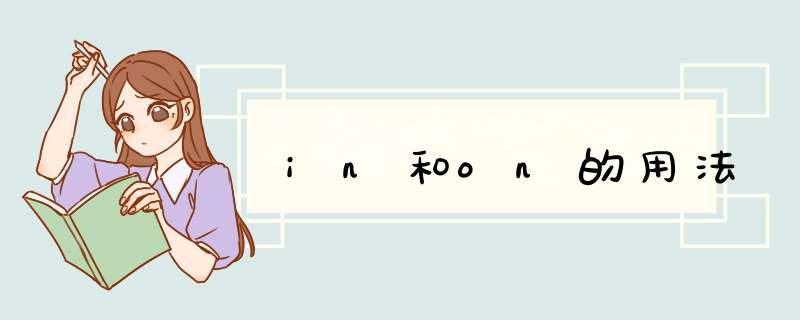
介词在英语中十分活跃,使用的频率很广,可以这么说,几乎每一句话都有介词的存在。
介词in和on是英语中两个常见的。
介词in,表示在某范围或空间内的某一点:在...里面。
例句:There are many students in the classroom.教室里有许多学生。
表示方式:用,以,按等。
例句:He is speaking in English.他在用英文讲话。
表示原因:由于,为了。
例句:She went in fear of her life.她为自己的生命担忧,所以走了。
表示领域,范围:在...以内。
例句:lt's not in my power to do that.做那事非我权限所能及。
表示结果:为了。
例句:They set off in search of the lost child.他们出发去寻找失踪的孩子。
表示方向:朝...方向。
例句:We saw them go in the forest.我们看见他们走进了森林。
表示状态:穿...衣服。
例句:The girl is pretty in red dress.这女孩穿红色连衣裙很漂亮。
介词on,表示位置:在...上面。
例句:The book is on the dest.书在课桌上。
表示时间:放在星期和具体某天前。
例句:I often go swimming on sundays.我经常周日去游泳。
On monday mornng, we have four classes.周一上午,我们有四节课。
表示:关于。
例句:We will have a talk on American history tomorrow.明天我们有关于美国历史的报告。
表示:从事... , 处于...情况。
例句:Who is on duty today?今天谁值日?
①in和on都可以表示某种空间关系:in表示“在...里面”,如:in the village 在村里;in the fields 在田里;in the woods 在树林里;in the wall 在墙里;on表示“在...上面”,如:on the table 在桌上;on the lake 在湖面上;on the wall 在墙上②in和on也都可以表示时间:in后面所接的都是较长时间。
具体用法有:a. 表示在较长的时间里(如周/月份/季节/年份/世纪等)。
如:in a week; in May; in spring/summer/autumn/winter; in 2008; in the 1990’s;b. 表示在上午、下午或晚上。
如:in the morning/afternoon/evening;c. “in + 一段时间”表示“多久以后/以内”,常与将来时连用。
如:in half an hour; in ten minutes; in a few days;on后面所接的时间多与日期有关。
具体用法有:a. 表示在具体的某一天(如日期、生日、节日或星期几)。
如:on May 4th, 1919; on Monday; on Teachers’ Day; on my birthday; on that day等.b. 表示某一天的上午、下午或晚上.如:on the morning of July 2; on Sunday afternoon; on a cold winter evening
欢迎分享,转载请注明来源:内存溢出

 微信扫一扫
微信扫一扫
 支付宝扫一扫
支付宝扫一扫
评论列表(0条)